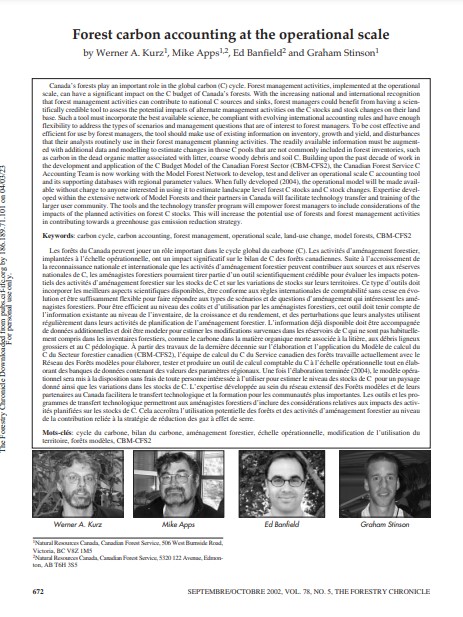Forest carbon accounting at the operational scale
Bosque Modelo:
Red Internacional de Bosques Modelo
Temática:
Cambio climático
Tipo de documento:
Artículo científico
Resumen
Canada’s forests play an important role in the global carbon (C) cycle. Forest management activities, implemented at the operational scale, can have a significant impact on the C budget of Canada’s forests. With the increasing national and international recognition that forest management activities can contribute to national C sources and sinks, forest managers could benefit from having a scientifically credible tool to assess the potential impacts of alternate management activities on the C stocks and stock changes on their land base. Such a tool must incorporate the best available science, be compliant with evolving international accounting rules and have enough flexibility to address the types of scenarios and management questions that are of interest to forest managers. To be cost effective and efficient for use by forest managers, the tool should make use of existing information on inventory, growth and yield, and disturbances that their analysts routinely use in their forest management planning activities. The readily available information must be augmented with additional data and modelling to estimate changes in those C pools that are not commonly included in forest inventories, such as carbon in the dead organic matter associated with litter, coarse woody debris and soil C. Building upon the past decade of work in the development and application of the C Budget Model of the Canadian Forest Sector (CBM-CFS2), the Canadian Forest Service C Accounting Team is now working with the Model Forest Network to develop, test and deliver an operational scale C accounting tool and its supporting databases with regional parameter values. When fully developed (2004), the operational model will be made available without charge to anyone interested in using it to estimate landscape level forest C stocks and C stock changes. Expertise developed within the extensive network of Model Forests and their partners in Canada will facilitate technology transfer and training of the larger user community. The tools and the technology transfer program will empower forest managers to include considerations of the impacts of the planned activities on forest C stocks. This will increase the potential use of forests and forest management activities in contributing towards a greenhouse gas emission reduction strategy.
Información Bibliográfica
Autor:
Kurz, WA, M Apps, E Banfield and G Stinson.
Revista:
Forestry Chronicle
Año:
2002
N°:
5
País :
Canadá
Páginas:
672 - 679
Volumen:
78
Idioma:
Ingles
Palabras claves
carbon cycle, carbon accounting, forest management, operational scale, land-use change, model forests, CBM-CFS2





